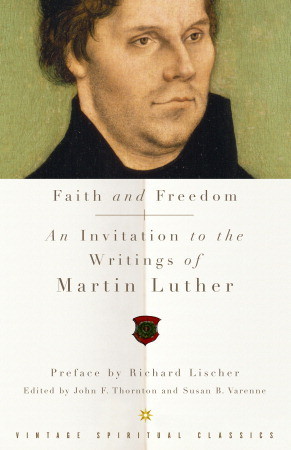- Bible
- Read the Bible
- Bible Versions
- Verse of the Day
- Reading Plans
- Verses by Topic
- Books of the Bible
- Bible Images
- Study
- Commentaries
- Concordances
- Dictionaries
- Encyclopedias
- Sermons
- Bible Atlas & Maps
- BP Wiki
- Devotionals
- Today's Devotionals
- Light of the World
- All Devotionals
- Inspirational Quotes
- More
- Picture Quotes
- Videos
- Inspirational
- Bible Study
- What The Bible Says
- Bible Q&As
- Daily Bread
- Bible by Genre
- Bible Stories
- Random Bible Verse
- Community
- Store
Faith and Freedom: An Invitation to the Writings of Martin Luther
by Martin Luther
Faith and Freedom: An Invitation to the Writings of Martin LutherFaith and Freedom: An Invitation to the Writings of Martin Luther is the first selection in decades for the general reader from the many dozens of volumes that constitute Martin Luther’s collected works. The selections included here, chosen for their pastoral tone, speak across the centuries and inform the spiritual concerns of today.Drawing on Luther’s Bible prefaces and commentaries, his treatises and sermons, his letters, his “table talk,” and his enduring hymnbook, Faith and Freedom Faith and Freedom will provide a spiritual resource for anyone seeking the heritage of modern Christian spirituality. Moreover, it requires no specialized knowledge of Reformation theology or Church history. Rich in language, direct, powerful, fresh in ideas, and often disquieting in their effect, the writings of Luther provide compelling reading.
BUY NOW
Paperback, 432 pages
Published May 7th 2002 by Vintage
© 2025 Bibleportal.com All rights reserved.

Martin Luther changed the course of Western civilization by initiating the Protestant Reformation. As a priest and theology professor, he confronted indulgence salesmen with his 95 Theses in 1517. Luther strongly disputed their claim that freedom from God's punishment of sin could be purchased with money. His refusal to retract all of his writings at the demand of Pope Leo X in 1520 and the Holy Roman Emperor Charles V at the Diet of Worms meeting in 1521 resulted in his excommunication by the pope and condemnation as an outlaw by the emperor.
Luther taught that salvation is a free gift of God and received only by grace through faith in Jesus as redeemer from sin, not from good works. His theology challenged the authority of the pope of the Roman Catholic Church by teaching that the Bible is the only source of divinely revealed knowledge and opposed sacerdotalism by considering all baptized Christians to be a holy priesthood.
His translation of the Bible into the language of the people (instead of Latin) made it more accessible, causing a tremendous impact on the church and on German culture. It fostered the development of a standard version of the German language, added several principles to the art of translation, and influenced the translation into English of the King James Bible. His hymns inspired the development of singing in churches. His marriage to Katharina von Bora set a model for the practice of clerical marriage, allowing Protestant priests to marry.
... Show more